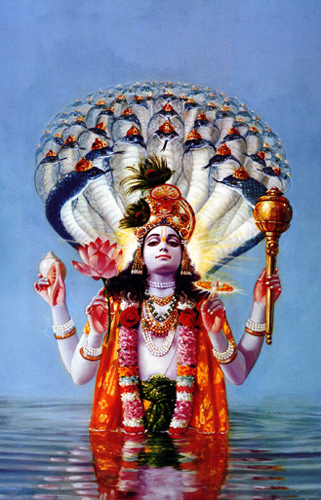(Sri Vishnu by Jadurani Dasi and Muralidhara Dasa posted to Flickr by user goblinbox)
Valmiki is the reciter of the stories in this unit, speaking in song and poetry. Perhaps I can find a good bardic rhythm structure to write lyrics for a retelling of the legend?
Rama and Lakshmana venture outside their home for the first time with Vishwamitra. Despite having some of the most sophisticated education, I'd like to think putting it into practice in a real life situation is another matter. Possibility to explore with the jungle Rakshashas?
Is there a dynamic we can explore with the four brothers? Wikipedia research shows that each play a role in cultivating the prosperity of their kingdom and each others lives. A good example is the pair of sandals Bharata places on the throne in place of the true ruler Rama, while he himself conducts governmental matters as an exile as well.
There is also the matter of Lakshmana, who stood beside his brother Rama in the thick and thin of the Rakshashas attack and the fourteen year exile.
One possible story idea is a story about how the four brothers comprise a whole unit that bring out the best of progress together. This will probably gain more evidence in the second set of reading notes.
Maybe incorporate the fact that the four brothers are reincarnations of Visnu into this kind of story too. Come to think of it, do the brothers even know they are reincarnations?
What form do the holy weapons Vishwamitra gives to Rama and Lakshmana take? They have no defined form from the text, so I like to imagine they take the form the brothers desire. Or that the holy spirits are the weapons themselves and act sort of like familiars, like in the vein of Stands from JoJo's Bizarre Adventure Part 3.
Expand the romance between Rama and Sita. Their prior engagement and their discussion of Rama's exile are good places to look for inspiration.
Bibliography
Ramayana, inspiration taken from Donald A. Mackenzie's Indian Myth and Legend (1913)

No comments:
Post a Comment